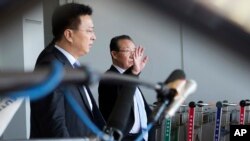North Korea's top nuclear negotiator is in Beijing for talks with Chinese officials, the latest in a series of diplomatic moves involving Pyongyang following months of tensions.
First Vice Foreign Minister Kim Kye Gwan is expected to hold talks with his Chinese counterpart Wednesday. Beijing says bilateral relations and the situation on the Korean peninsula will be discussed.
North Korea's longtime ally China has grown impatient with Pyongyang, especially after the North's latest nuclear test in February. Beijing has since cracked down on North Korean bank accounts as part of new U.N. sanctions.
China has repeatedly urged North Korea to return to six-party negotiations on its nuclear weapons program. Kim, the North Korean delegate visiting Beijing, was Pyongyang's main negotiator at the talks, which the North abandoned in 2009.
Meanwhile, U.S. President Barack Obama says he thinks China has been getting tougher on Pyongyang. In an interview broadcast Monday on "The Charlie Rose Show" on PBS television, Obama said Beijing is "taking more seriously the problem of constant provocations" from North Korea."
Tensions on the Korean peninsula reached their highest level in years, following the North's nuclear test in February and satellite launch in December. The U.N. expanded sanctions in response to the tests, prompting Pyongyang to threaten to wage nuclear war on the United States and its allies.
The tensions have since cooled. And although North Korea has repeatedly said it is not willing to consider abandoning its nuclear weapons, it has in recent weeks signaled it is open to dialogue.
On Sunday, the North unexpectedly proposed "senior-level" talks with the U.S. to help ease tensions and negotiate a formal peace treaty to end the Korean War, which ended only in a truce.
A State Department spokesperson on Monday said the U.S. is open to "credible" negotiations with the North, but said it must take steps toward "concrete denuclearization" before any talks take place.
U.S., South Korean and Japanese officials are expected to discuss how to proceed with Pyongyang when they meet this week in Washington at talks hosted by Glyn Davies, the U.S. special representative for North Korea.
South Korea's Yonhap news agency said Seoul's top envoy on North Korea, Cho Tae-Young, told reporters before leaving for Washington that there is no point in having "talks for talks' sake." But he said it could be important to "rebuild trust so that progress can be made toward the goal of denuclearizing North Korea."
First Vice Foreign Minister Kim Kye Gwan is expected to hold talks with his Chinese counterpart Wednesday. Beijing says bilateral relations and the situation on the Korean peninsula will be discussed.
North Korea's longtime ally China has grown impatient with Pyongyang, especially after the North's latest nuclear test in February. Beijing has since cracked down on North Korean bank accounts as part of new U.N. sanctions.
China has repeatedly urged North Korea to return to six-party negotiations on its nuclear weapons program. Kim, the North Korean delegate visiting Beijing, was Pyongyang's main negotiator at the talks, which the North abandoned in 2009.
Meanwhile, U.S. President Barack Obama says he thinks China has been getting tougher on Pyongyang. In an interview broadcast Monday on "The Charlie Rose Show" on PBS television, Obama said Beijing is "taking more seriously the problem of constant provocations" from North Korea."
Tensions on the Korean peninsula reached their highest level in years, following the North's nuclear test in February and satellite launch in December. The U.N. expanded sanctions in response to the tests, prompting Pyongyang to threaten to wage nuclear war on the United States and its allies.
The tensions have since cooled. And although North Korea has repeatedly said it is not willing to consider abandoning its nuclear weapons, it has in recent weeks signaled it is open to dialogue.
On Sunday, the North unexpectedly proposed "senior-level" talks with the U.S. to help ease tensions and negotiate a formal peace treaty to end the Korean War, which ended only in a truce.
A State Department spokesperson on Monday said the U.S. is open to "credible" negotiations with the North, but said it must take steps toward "concrete denuclearization" before any talks take place.
U.S., South Korean and Japanese officials are expected to discuss how to proceed with Pyongyang when they meet this week in Washington at talks hosted by Glyn Davies, the U.S. special representative for North Korea.
South Korea's Yonhap news agency said Seoul's top envoy on North Korea, Cho Tae-Young, told reporters before leaving for Washington that there is no point in having "talks for talks' sake." But he said it could be important to "rebuild trust so that progress can be made toward the goal of denuclearizing North Korea."
